Existentialism in English Literature: A Comparative Study of James Joyce's A Portrait of the Artist as a Young Man and James Baldwin's Sonny's Blues
VerifiedAdded on 2023/05/28
|7
|2009
|122
AI Summary
This paper explores the theme of existentialism in English literature through a comparative study of James Joyce's A Portrait of the Artist as a Young Man and James Baldwin's Sonny's Blues. The paper discusses the struggles of the characters and their journey towards individual being, liberty, and independence.
Contribute Materials
Your contribution can guide someone’s learning journey. Share your
documents today.
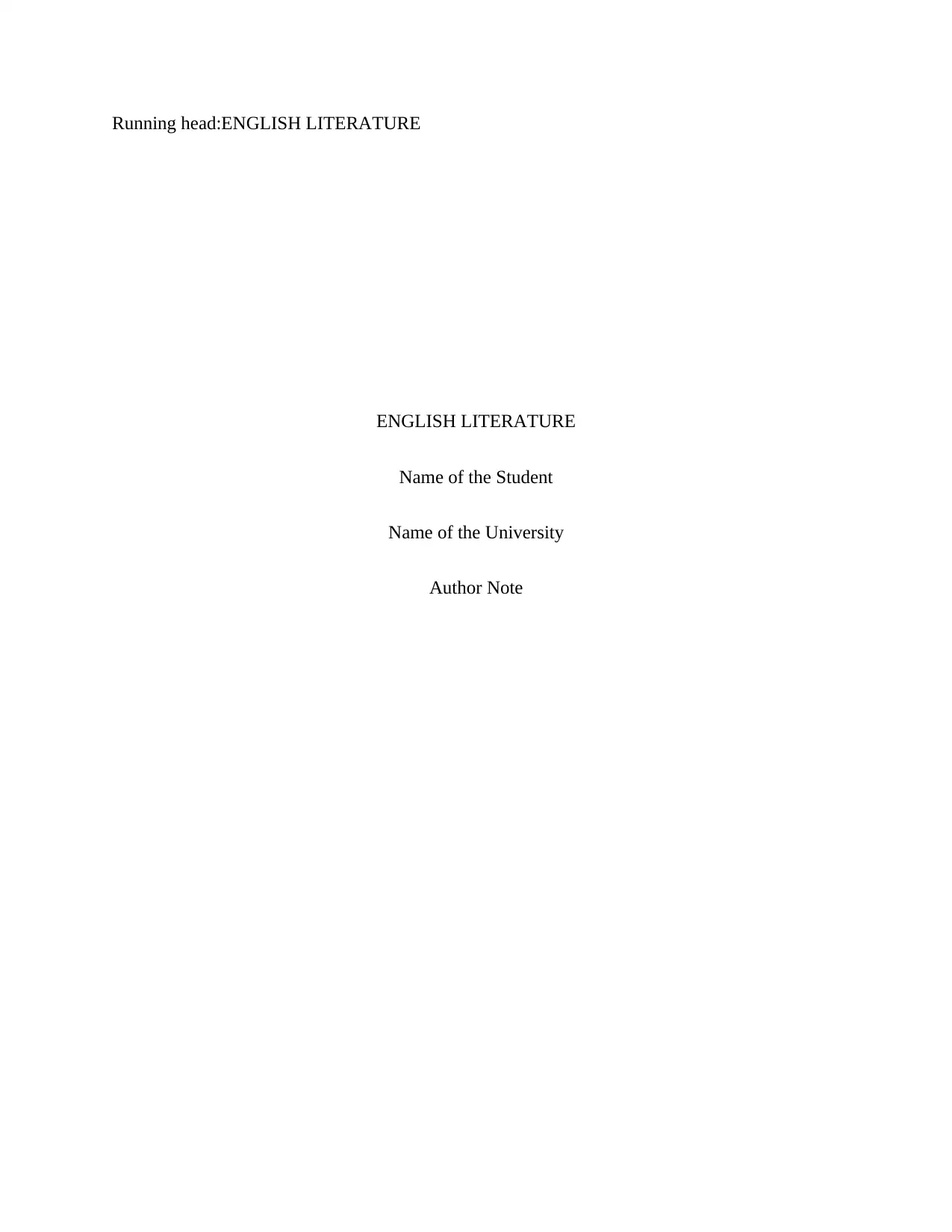
Running head:ENGLISH LITERATURE
ENGLISH LITERATURE
Name of the Student
Name of the University
Author Note
ENGLISH LITERATURE
Name of the Student
Name of the University
Author Note
Secure Best Marks with AI Grader
Need help grading? Try our AI Grader for instant feedback on your assignments.
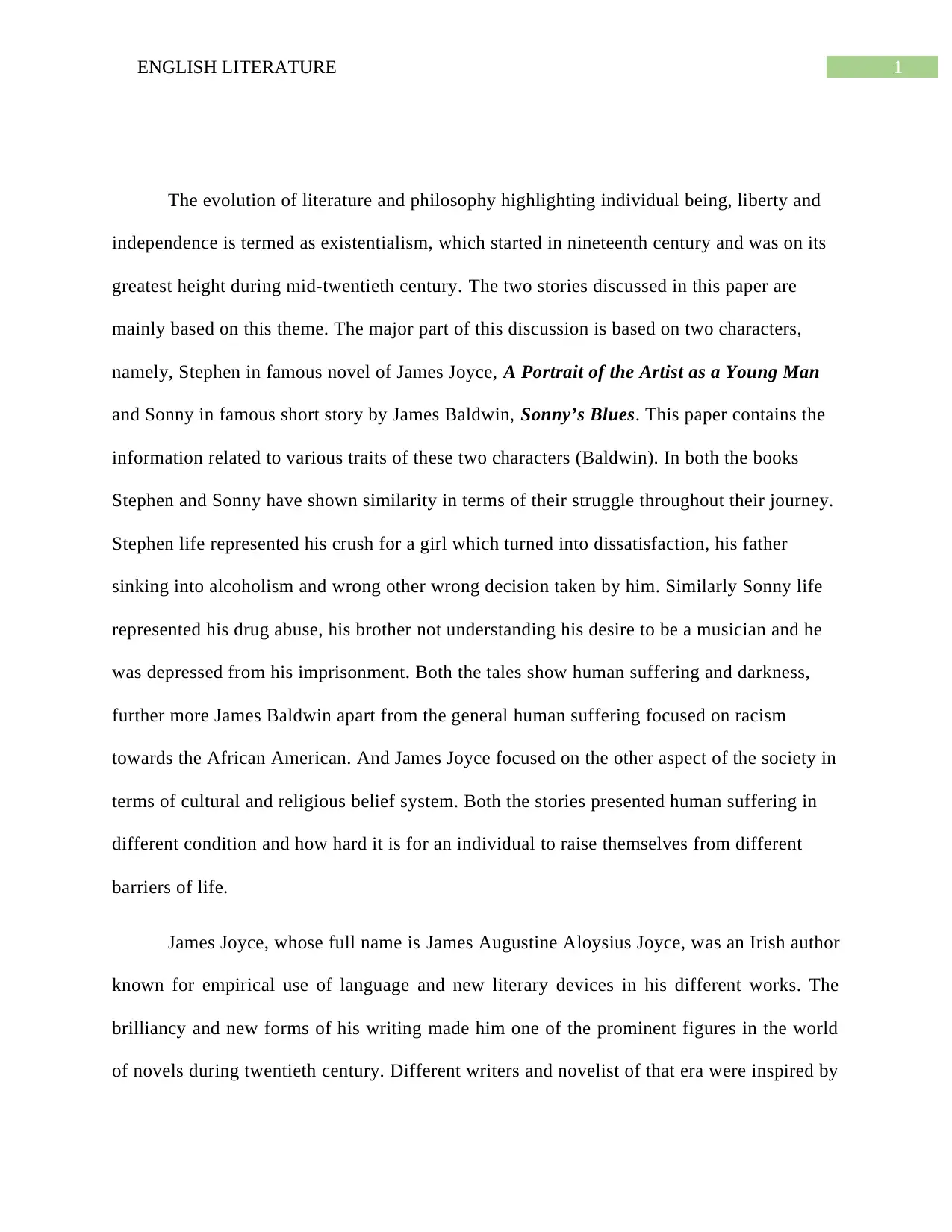
1ENGLISH LITERATURE
The evolution of literature and philosophy highlighting individual being, liberty and
independence is termed as existentialism, which started in nineteenth century and was on its
greatest height during mid-twentieth century. The two stories discussed in this paper are
mainly based on this theme. The major part of this discussion is based on two characters,
namely, Stephen in famous novel of James Joyce, A Portrait of the Artist as a Young Man
and Sonny in famous short story by James Baldwin, Sonny’s Blues. This paper contains the
information related to various traits of these two characters (Baldwin). In both the books
Stephen and Sonny have shown similarity in terms of their struggle throughout their journey.
Stephen life represented his crush for a girl which turned into dissatisfaction, his father
sinking into alcoholism and wrong other wrong decision taken by him. Similarly Sonny life
represented his drug abuse, his brother not understanding his desire to be a musician and he
was depressed from his imprisonment. Both the tales show human suffering and darkness,
further more James Baldwin apart from the general human suffering focused on racism
towards the African American. And James Joyce focused on the other aspect of the society in
terms of cultural and religious belief system. Both the stories presented human suffering in
different condition and how hard it is for an individual to raise themselves from different
barriers of life.
James Joyce, whose full name is James Augustine Aloysius Joyce, was an Irish author
known for empirical use of language and new literary devices in his different works. The
brilliancy and new forms of his writing made him one of the prominent figures in the world
of novels during twentieth century. Different writers and novelist of that era were inspired by
The evolution of literature and philosophy highlighting individual being, liberty and
independence is termed as existentialism, which started in nineteenth century and was on its
greatest height during mid-twentieth century. The two stories discussed in this paper are
mainly based on this theme. The major part of this discussion is based on two characters,
namely, Stephen in famous novel of James Joyce, A Portrait of the Artist as a Young Man
and Sonny in famous short story by James Baldwin, Sonny’s Blues. This paper contains the
information related to various traits of these two characters (Baldwin). In both the books
Stephen and Sonny have shown similarity in terms of their struggle throughout their journey.
Stephen life represented his crush for a girl which turned into dissatisfaction, his father
sinking into alcoholism and wrong other wrong decision taken by him. Similarly Sonny life
represented his drug abuse, his brother not understanding his desire to be a musician and he
was depressed from his imprisonment. Both the tales show human suffering and darkness,
further more James Baldwin apart from the general human suffering focused on racism
towards the African American. And James Joyce focused on the other aspect of the society in
terms of cultural and religious belief system. Both the stories presented human suffering in
different condition and how hard it is for an individual to raise themselves from different
barriers of life.
James Joyce, whose full name is James Augustine Aloysius Joyce, was an Irish author
known for empirical use of language and new literary devices in his different works. The
brilliancy and new forms of his writing made him one of the prominent figures in the world
of novels during twentieth century. Different writers and novelist of that era were inspired by
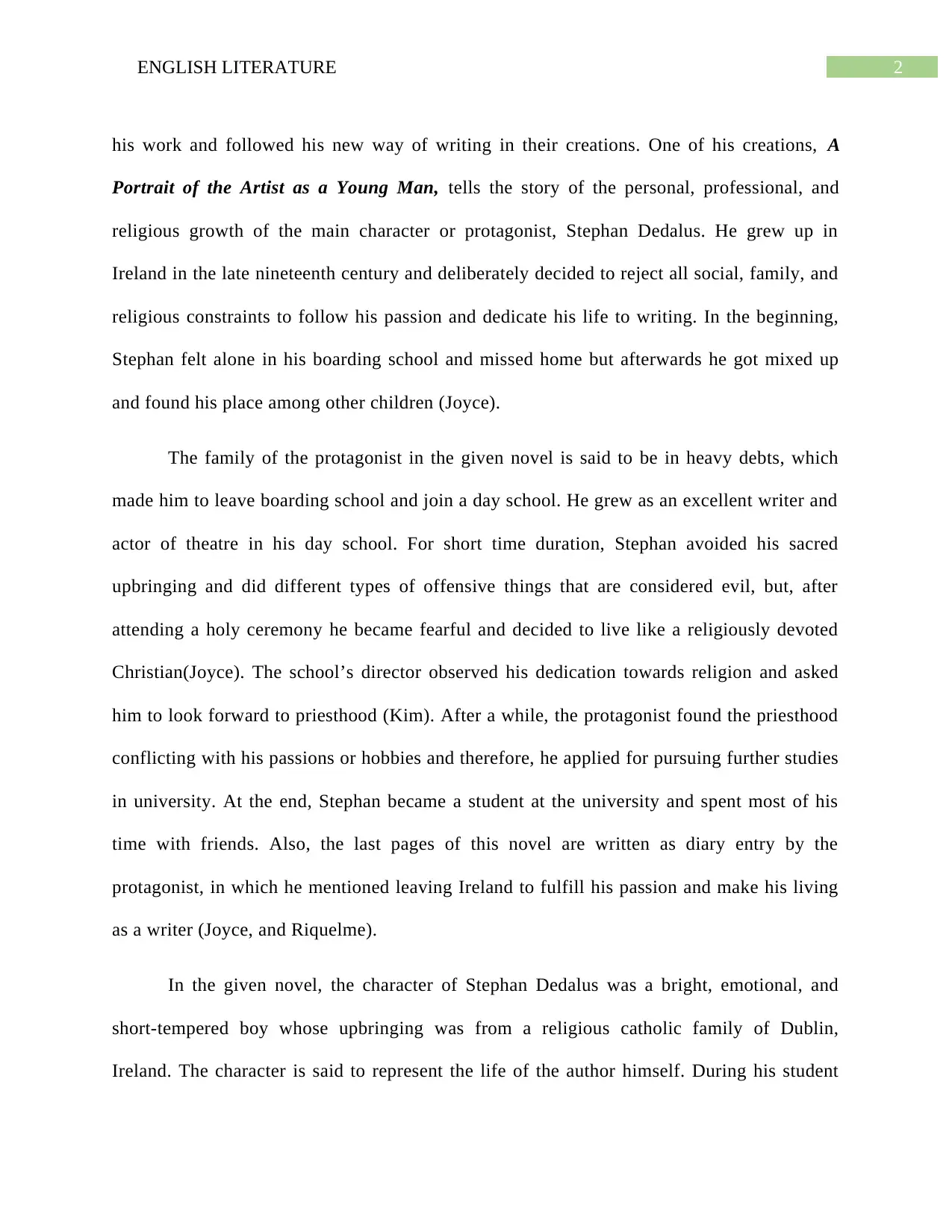
2ENGLISH LITERATURE
his work and followed his new way of writing in their creations. One of his creations, A
Portrait of the Artist as a Young Man, tells the story of the personal, professional, and
religious growth of the main character or protagonist, Stephan Dedalus. He grew up in
Ireland in the late nineteenth century and deliberately decided to reject all social, family, and
religious constraints to follow his passion and dedicate his life to writing. In the beginning,
Stephan felt alone in his boarding school and missed home but afterwards he got mixed up
and found his place among other children (Joyce).
The family of the protagonist in the given novel is said to be in heavy debts, which
made him to leave boarding school and join a day school. He grew as an excellent writer and
actor of theatre in his day school. For short time duration, Stephan avoided his sacred
upbringing and did different types of offensive things that are considered evil, but, after
attending a holy ceremony he became fearful and decided to live like a religiously devoted
Christian(Joyce). The school’s director observed his dedication towards religion and asked
him to look forward to priesthood (Kim). After a while, the protagonist found the priesthood
conflicting with his passions or hobbies and therefore, he applied for pursuing further studies
in university. At the end, Stephan became a student at the university and spent most of his
time with friends. Also, the last pages of this novel are written as diary entry by the
protagonist, in which he mentioned leaving Ireland to fulfill his passion and make his living
as a writer (Joyce, and Riquelme).
In the given novel, the character of Stephan Dedalus was a bright, emotional, and
short-tempered boy whose upbringing was from a religious catholic family of Dublin,
Ireland. The character is said to represent the life of the author himself. During his student
his work and followed his new way of writing in their creations. One of his creations, A
Portrait of the Artist as a Young Man, tells the story of the personal, professional, and
religious growth of the main character or protagonist, Stephan Dedalus. He grew up in
Ireland in the late nineteenth century and deliberately decided to reject all social, family, and
religious constraints to follow his passion and dedicate his life to writing. In the beginning,
Stephan felt alone in his boarding school and missed home but afterwards he got mixed up
and found his place among other children (Joyce).
The family of the protagonist in the given novel is said to be in heavy debts, which
made him to leave boarding school and join a day school. He grew as an excellent writer and
actor of theatre in his day school. For short time duration, Stephan avoided his sacred
upbringing and did different types of offensive things that are considered evil, but, after
attending a holy ceremony he became fearful and decided to live like a religiously devoted
Christian(Joyce). The school’s director observed his dedication towards religion and asked
him to look forward to priesthood (Kim). After a while, the protagonist found the priesthood
conflicting with his passions or hobbies and therefore, he applied for pursuing further studies
in university. At the end, Stephan became a student at the university and spent most of his
time with friends. Also, the last pages of this novel are written as diary entry by the
protagonist, in which he mentioned leaving Ireland to fulfill his passion and make his living
as a writer (Joyce, and Riquelme).
In the given novel, the character of Stephan Dedalus was a bright, emotional, and
short-tempered boy whose upbringing was from a religious catholic family of Dublin,
Ireland. The character is said to represent the life of the author himself. During his student
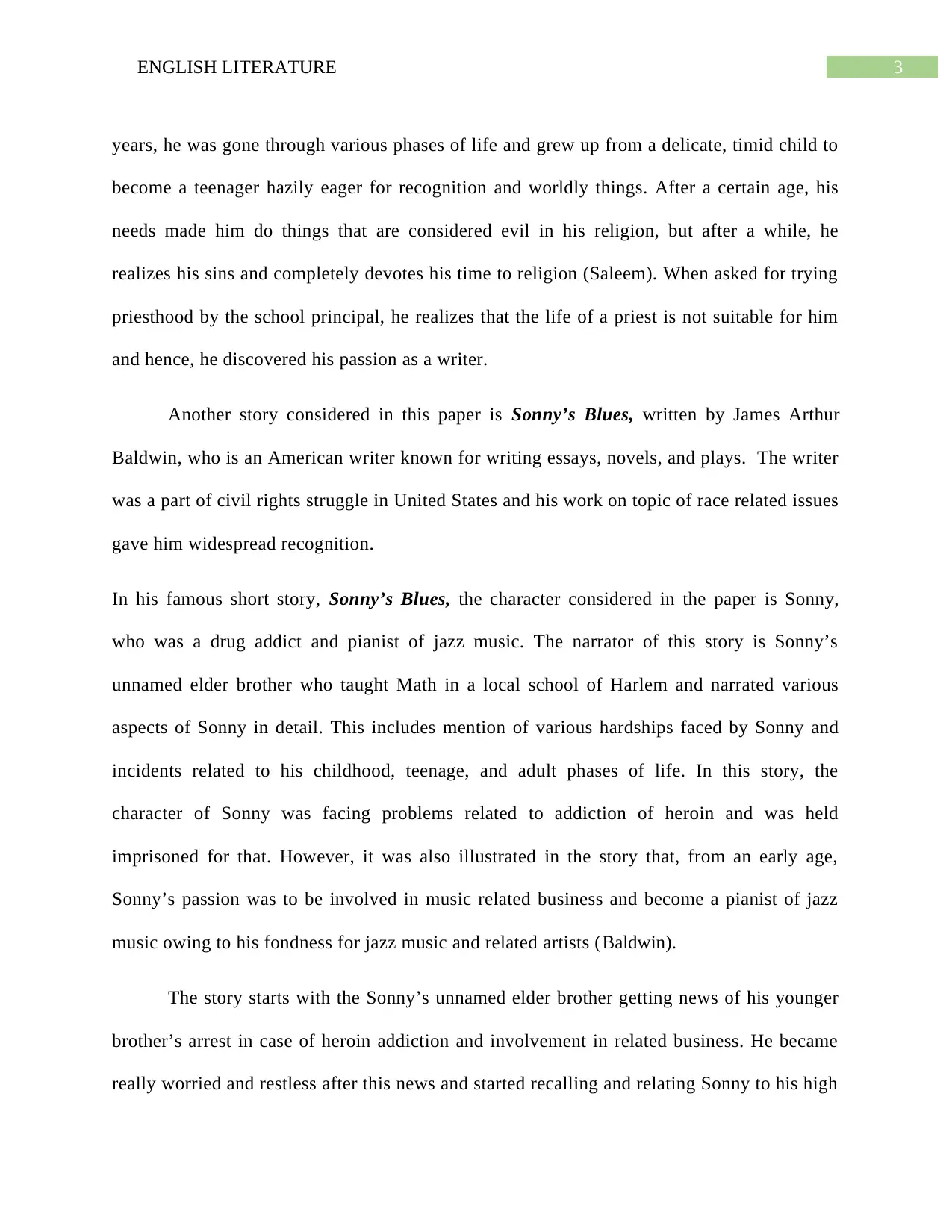
3ENGLISH LITERATURE
years, he was gone through various phases of life and grew up from a delicate, timid child to
become a teenager hazily eager for recognition and worldly things. After a certain age, his
needs made him do things that are considered evil in his religion, but after a while, he
realizes his sins and completely devotes his time to religion (Saleem). When asked for trying
priesthood by the school principal, he realizes that the life of a priest is not suitable for him
and hence, he discovered his passion as a writer.
Another story considered in this paper is Sonny’s Blues, written by James Arthur
Baldwin, who is an American writer known for writing essays, novels, and plays. The writer
was a part of civil rights struggle in United States and his work on topic of race related issues
gave him widespread recognition.
In his famous short story, Sonny’s Blues, the character considered in the paper is Sonny,
who was a drug addict and pianist of jazz music. The narrator of this story is Sonny’s
unnamed elder brother who taught Math in a local school of Harlem and narrated various
aspects of Sonny in detail. This includes mention of various hardships faced by Sonny and
incidents related to his childhood, teenage, and adult phases of life. In this story, the
character of Sonny was facing problems related to addiction of heroin and was held
imprisoned for that. However, it was also illustrated in the story that, from an early age,
Sonny’s passion was to be involved in music related business and become a pianist of jazz
music owing to his fondness for jazz music and related artists (Baldwin).
The story starts with the Sonny’s unnamed elder brother getting news of his younger
brother’s arrest in case of heroin addiction and involvement in related business. He became
really worried and restless after this news and started recalling and relating Sonny to his high
years, he was gone through various phases of life and grew up from a delicate, timid child to
become a teenager hazily eager for recognition and worldly things. After a certain age, his
needs made him do things that are considered evil in his religion, but after a while, he
realizes his sins and completely devotes his time to religion (Saleem). When asked for trying
priesthood by the school principal, he realizes that the life of a priest is not suitable for him
and hence, he discovered his passion as a writer.
Another story considered in this paper is Sonny’s Blues, written by James Arthur
Baldwin, who is an American writer known for writing essays, novels, and plays. The writer
was a part of civil rights struggle in United States and his work on topic of race related issues
gave him widespread recognition.
In his famous short story, Sonny’s Blues, the character considered in the paper is Sonny,
who was a drug addict and pianist of jazz music. The narrator of this story is Sonny’s
unnamed elder brother who taught Math in a local school of Harlem and narrated various
aspects of Sonny in detail. This includes mention of various hardships faced by Sonny and
incidents related to his childhood, teenage, and adult phases of life. In this story, the
character of Sonny was facing problems related to addiction of heroin and was held
imprisoned for that. However, it was also illustrated in the story that, from an early age,
Sonny’s passion was to be involved in music related business and become a pianist of jazz
music owing to his fondness for jazz music and related artists (Baldwin).
The story starts with the Sonny’s unnamed elder brother getting news of his younger
brother’s arrest in case of heroin addiction and involvement in related business. He became
really worried and restless after this news and started recalling and relating Sonny to his high
Secure Best Marks with AI Grader
Need help grading? Try our AI Grader for instant feedback on your assignments.
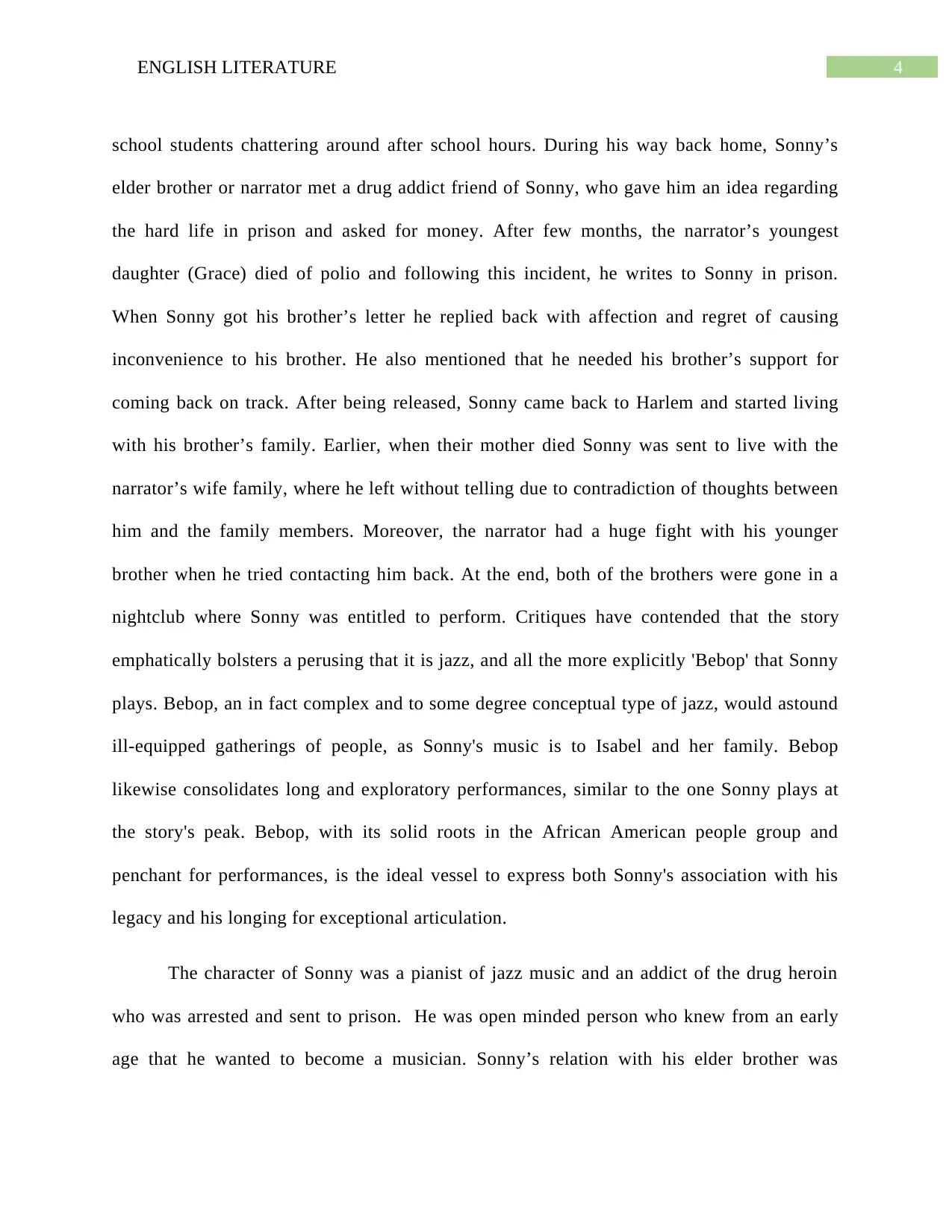
4ENGLISH LITERATURE
school students chattering around after school hours. During his way back home, Sonny’s
elder brother or narrator met a drug addict friend of Sonny, who gave him an idea regarding
the hard life in prison and asked for money. After few months, the narrator’s youngest
daughter (Grace) died of polio and following this incident, he writes to Sonny in prison.
When Sonny got his brother’s letter he replied back with affection and regret of causing
inconvenience to his brother. He also mentioned that he needed his brother’s support for
coming back on track. After being released, Sonny came back to Harlem and started living
with his brother’s family. Earlier, when their mother died Sonny was sent to live with the
narrator’s wife family, where he left without telling due to contradiction of thoughts between
him and the family members. Moreover, the narrator had a huge fight with his younger
brother when he tried contacting him back. At the end, both of the brothers were gone in a
nightclub where Sonny was entitled to perform. Critiques have contended that the story
emphatically bolsters a perusing that it is jazz, and all the more explicitly 'Bebop' that Sonny
plays. Bebop, an in fact complex and to some degree conceptual type of jazz, would astound
ill-equipped gatherings of people, as Sonny's music is to Isabel and her family. Bebop
likewise consolidates long and exploratory performances, similar to the one Sonny plays at
the story's peak. Bebop, with its solid roots in the African American people group and
penchant for performances, is the ideal vessel to express both Sonny's association with his
legacy and his longing for exceptional articulation.
The character of Sonny was a pianist of jazz music and an addict of the drug heroin
who was arrested and sent to prison. He was open minded person who knew from an early
age that he wanted to become a musician. Sonny’s relation with his elder brother was
school students chattering around after school hours. During his way back home, Sonny’s
elder brother or narrator met a drug addict friend of Sonny, who gave him an idea regarding
the hard life in prison and asked for money. After few months, the narrator’s youngest
daughter (Grace) died of polio and following this incident, he writes to Sonny in prison.
When Sonny got his brother’s letter he replied back with affection and regret of causing
inconvenience to his brother. He also mentioned that he needed his brother’s support for
coming back on track. After being released, Sonny came back to Harlem and started living
with his brother’s family. Earlier, when their mother died Sonny was sent to live with the
narrator’s wife family, where he left without telling due to contradiction of thoughts between
him and the family members. Moreover, the narrator had a huge fight with his younger
brother when he tried contacting him back. At the end, both of the brothers were gone in a
nightclub where Sonny was entitled to perform. Critiques have contended that the story
emphatically bolsters a perusing that it is jazz, and all the more explicitly 'Bebop' that Sonny
plays. Bebop, an in fact complex and to some degree conceptual type of jazz, would astound
ill-equipped gatherings of people, as Sonny's music is to Isabel and her family. Bebop
likewise consolidates long and exploratory performances, similar to the one Sonny plays at
the story's peak. Bebop, with its solid roots in the African American people group and
penchant for performances, is the ideal vessel to express both Sonny's association with his
legacy and his longing for exceptional articulation.
The character of Sonny was a pianist of jazz music and an addict of the drug heroin
who was arrested and sent to prison. He was open minded person who knew from an early
age that he wanted to become a musician. Sonny’s relation with his elder brother was
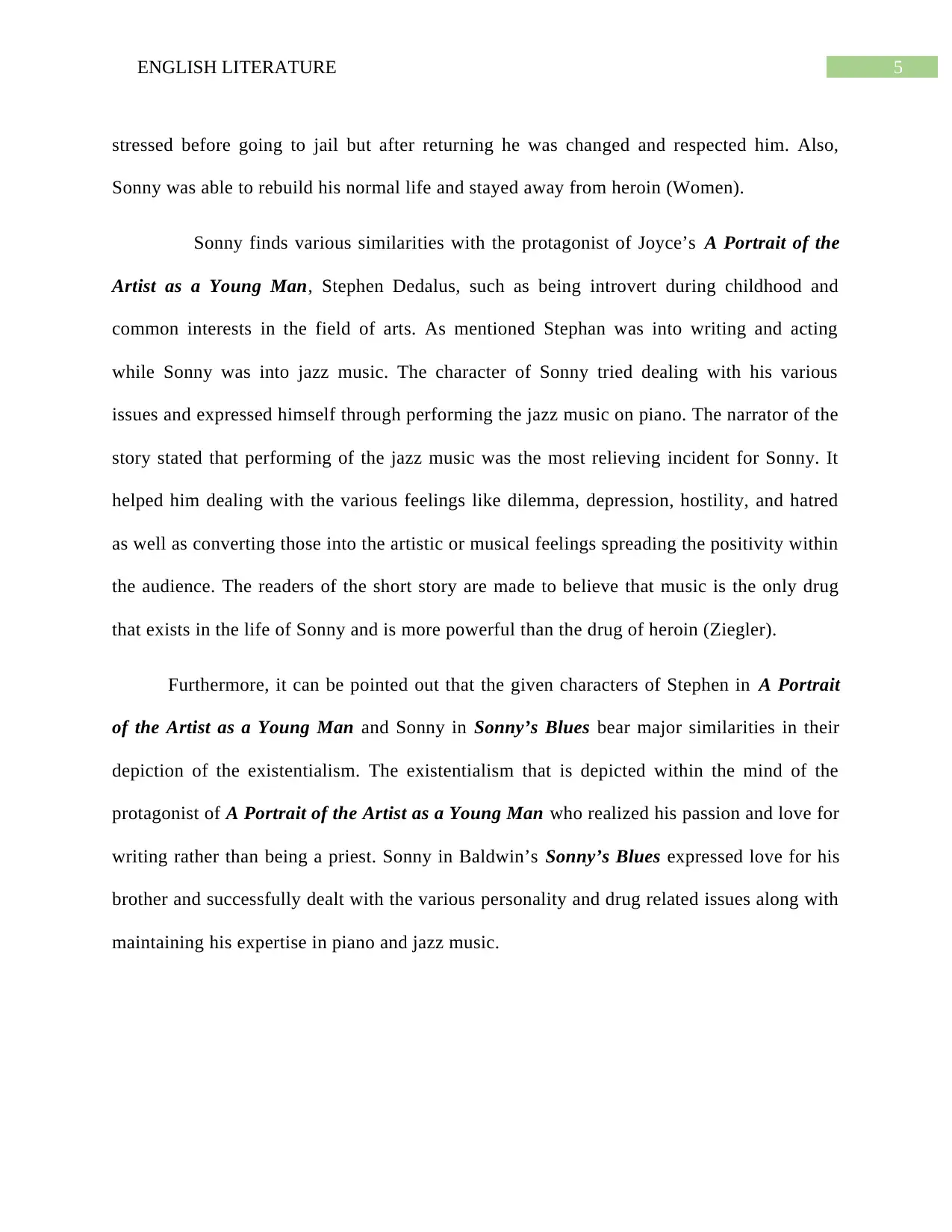
5ENGLISH LITERATURE
stressed before going to jail but after returning he was changed and respected him. Also,
Sonny was able to rebuild his normal life and stayed away from heroin (Women).
Sonny finds various similarities with the protagonist of Joyce’s A Portrait of the
Artist as a Young Man, Stephen Dedalus, such as being introvert during childhood and
common interests in the field of arts. As mentioned Stephan was into writing and acting
while Sonny was into jazz music. The character of Sonny tried dealing with his various
issues and expressed himself through performing the jazz music on piano. The narrator of the
story stated that performing of the jazz music was the most relieving incident for Sonny. It
helped him dealing with the various feelings like dilemma, depression, hostility, and hatred
as well as converting those into the artistic or musical feelings spreading the positivity within
the audience. The readers of the short story are made to believe that music is the only drug
that exists in the life of Sonny and is more powerful than the drug of heroin (Ziegler).
Furthermore, it can be pointed out that the given characters of Stephen in A Portrait
of the Artist as a Young Man and Sonny in Sonny’s Blues bear major similarities in their
depiction of the existentialism. The existentialism that is depicted within the mind of the
protagonist of A Portrait of the Artist as a Young Man who realized his passion and love for
writing rather than being a priest. Sonny in Baldwin’s Sonny’s Blues expressed love for his
brother and successfully dealt with the various personality and drug related issues along with
maintaining his expertise in piano and jazz music.
stressed before going to jail but after returning he was changed and respected him. Also,
Sonny was able to rebuild his normal life and stayed away from heroin (Women).
Sonny finds various similarities with the protagonist of Joyce’s A Portrait of the
Artist as a Young Man, Stephen Dedalus, such as being introvert during childhood and
common interests in the field of arts. As mentioned Stephan was into writing and acting
while Sonny was into jazz music. The character of Sonny tried dealing with his various
issues and expressed himself through performing the jazz music on piano. The narrator of the
story stated that performing of the jazz music was the most relieving incident for Sonny. It
helped him dealing with the various feelings like dilemma, depression, hostility, and hatred
as well as converting those into the artistic or musical feelings spreading the positivity within
the audience. The readers of the short story are made to believe that music is the only drug
that exists in the life of Sonny and is more powerful than the drug of heroin (Ziegler).
Furthermore, it can be pointed out that the given characters of Stephen in A Portrait
of the Artist as a Young Man and Sonny in Sonny’s Blues bear major similarities in their
depiction of the existentialism. The existentialism that is depicted within the mind of the
protagonist of A Portrait of the Artist as a Young Man who realized his passion and love for
writing rather than being a priest. Sonny in Baldwin’s Sonny’s Blues expressed love for his
brother and successfully dealt with the various personality and drug related issues along with
maintaining his expertise in piano and jazz music.
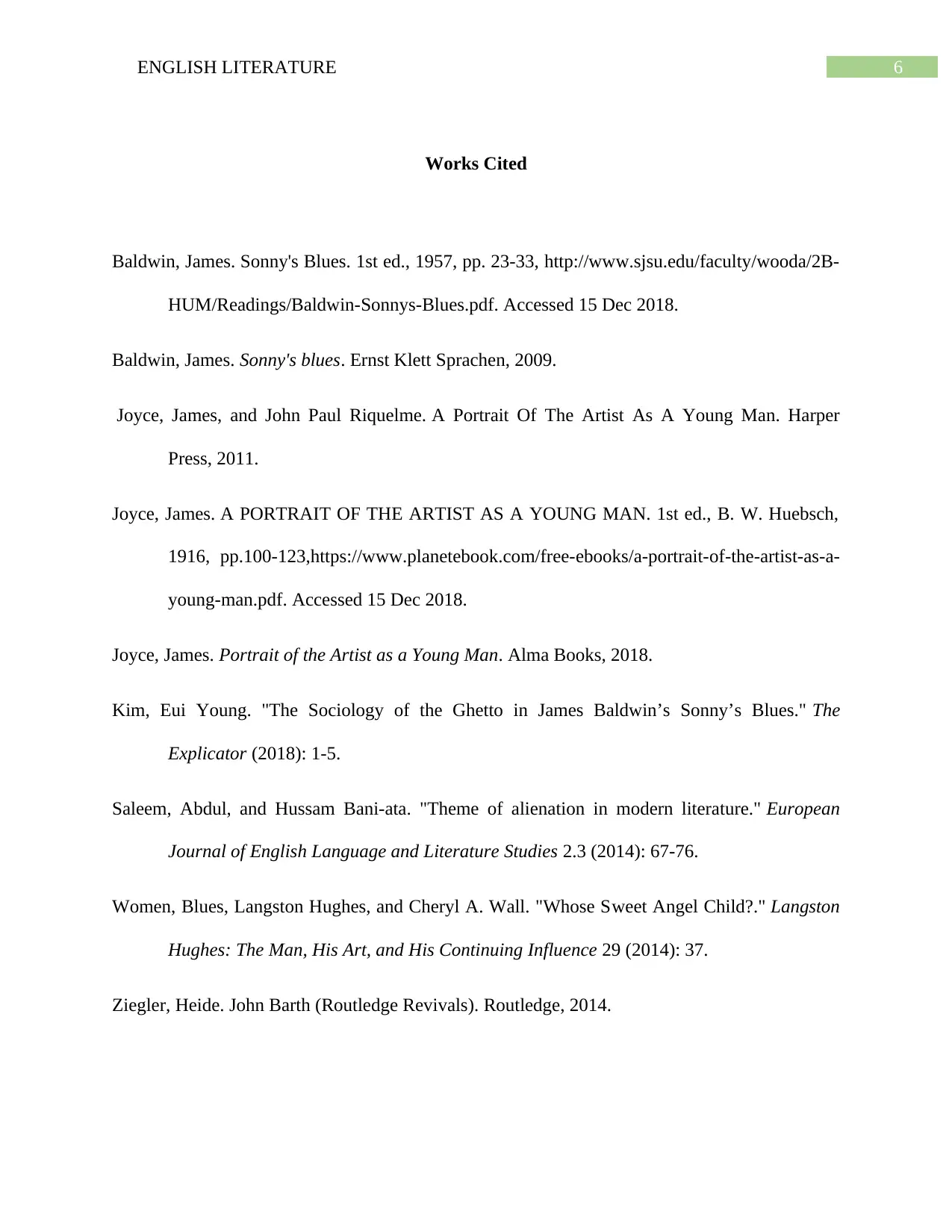
6ENGLISH LITERATURE
Works Cited
Baldwin, James. Sonny's Blues. 1st ed., 1957, pp. 23-33, http://www.sjsu.edu/faculty/wooda/2B-
HUM/Readings/Baldwin-Sonnys-Blues.pdf. Accessed 15 Dec 2018.
Baldwin, James. Sonny's blues. Ernst Klett Sprachen, 2009.
Joyce, James, and John Paul Riquelme. A Portrait Of The Artist As A Young Man. Harper
Press, 2011.
Joyce, James. A PORTRAIT OF THE ARTIST AS A YOUNG MAN. 1st ed., B. W. Huebsch,
1916, pp.100-123,https://www.planetebook.com/free-ebooks/a-portrait-of-the-artist-as-a-
young-man.pdf. Accessed 15 Dec 2018.
Joyce, James. Portrait of the Artist as a Young Man. Alma Books, 2018.
Kim, Eui Young. "The Sociology of the Ghetto in James Baldwin’s Sonny’s Blues." The
Explicator (2018): 1-5.
Saleem, Abdul, and Hussam Bani-ata. "Theme of alienation in modern literature." European
Journal of English Language and Literature Studies 2.3 (2014): 67-76.
Women, Blues, Langston Hughes, and Cheryl A. Wall. "Whose Sweet Angel Child?." Langston
Hughes: The Man, His Art, and His Continuing Influence 29 (2014): 37.
Ziegler, Heide. John Barth (Routledge Revivals). Routledge, 2014.
Works Cited
Baldwin, James. Sonny's Blues. 1st ed., 1957, pp. 23-33, http://www.sjsu.edu/faculty/wooda/2B-
HUM/Readings/Baldwin-Sonnys-Blues.pdf. Accessed 15 Dec 2018.
Baldwin, James. Sonny's blues. Ernst Klett Sprachen, 2009.
Joyce, James, and John Paul Riquelme. A Portrait Of The Artist As A Young Man. Harper
Press, 2011.
Joyce, James. A PORTRAIT OF THE ARTIST AS A YOUNG MAN. 1st ed., B. W. Huebsch,
1916, pp.100-123,https://www.planetebook.com/free-ebooks/a-portrait-of-the-artist-as-a-
young-man.pdf. Accessed 15 Dec 2018.
Joyce, James. Portrait of the Artist as a Young Man. Alma Books, 2018.
Kim, Eui Young. "The Sociology of the Ghetto in James Baldwin’s Sonny’s Blues." The
Explicator (2018): 1-5.
Saleem, Abdul, and Hussam Bani-ata. "Theme of alienation in modern literature." European
Journal of English Language and Literature Studies 2.3 (2014): 67-76.
Women, Blues, Langston Hughes, and Cheryl A. Wall. "Whose Sweet Angel Child?." Langston
Hughes: The Man, His Art, and His Continuing Influence 29 (2014): 37.
Ziegler, Heide. John Barth (Routledge Revivals). Routledge, 2014.
1 out of 7
Your All-in-One AI-Powered Toolkit for Academic Success.
+13062052269
info@desklib.com
Available 24*7 on WhatsApp / Email
![[object Object]](/_next/static/media/star-bottom.7253800d.svg)
Unlock your academic potential
© 2024 | Zucol Services PVT LTD | All rights reserved.

